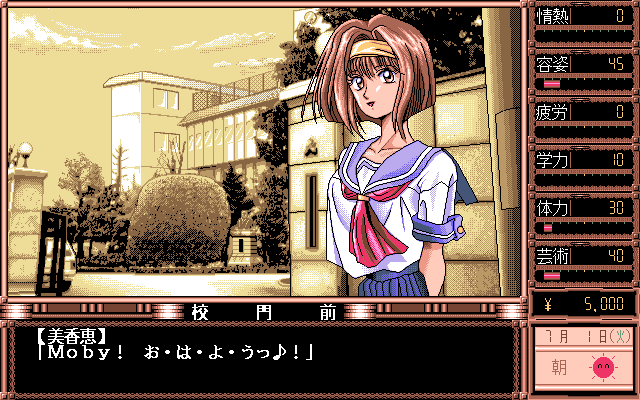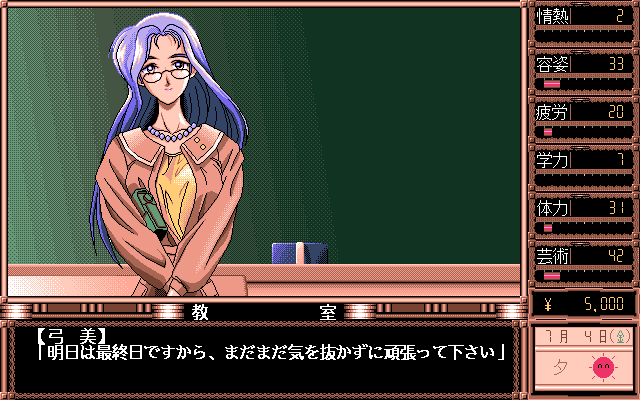Retro Replay Review
Gameplay
True Love’s gameplay centers around careful time management as you guide your character through the last summer before college. Each day is broken into three segments—morning, afternoon, and evening—and you choose between activities like studying, sports, part-time work, or leisure. These choices don’t just pass the time; they directly influence your character’s stats in categories such as intelligence, charisma, and stamina. As you allocate your days, you’ll unlock special events, mini-games, and dialogue sequences that bring you closer to one of the ten romanceable characters.
(HEY YOU!! We hope you enjoy! We try not to run ads. So basically, this is a very expensive hobby running this site. Please consider joining us for updates, forums, and more. Network w/ us to make some cash or friends while retro gaming, and you can win some free retro games for posting. Okay, carry on 👍)
The simulation elements are complemented by light role-playing mechanics. Leveling up your skills is essential because each girl has her unique preferences: Mikae favors academic excellence, Chiemi responds to athletic prowess, and Miss Yumi appreciates mature conversation. By raising the relevant attribute high enough, you trigger “bond events” that deepen your relationship with that character. Failing to meet a girl’s interest threshold can close off her route entirely, adding tension to every decision you make.
Another key feature is the branching narrative structure. True Love tracks not only your stats but also flags for specific dialogue choices and story triggers. This encourages multiple playthroughs to see all possible endings. Random encounters and surprise phone calls can throw a wrench in your schedule, requiring you to adapt on the fly. The result is a gameplay loop that balances strategic planning with the unpredictability of social simulation.
Graphics
While True Love is not a high-budget 3D title, its 2D presentation has a charming, hand-drawn quality reminiscent of late-90s visual novels. Character portraits are expressive, with subtle changes in facial expression and posture that reflect the tone of each conversation. Background art is clean and functional, depicting everyday locales—classrooms, parks, beachside cafes—with just enough detail to feel immersive without distracting from the characters.
Cut-in illustrations accompany major events, providing a splash of color and emotion when milestones are reached. These art assets are well-timed to heighten the drama of confession scenes or pivotal decisions. The user interface is straightforward: menus that let you allocate time blocks, view relationship meters, and access your calendar. It’s intuitive, though some players might wish for a slightly more modern aesthetic.
Overall, the graphics do a solid job of supporting the game’s core focus: building relationships. There are no flashy effects or dynamic camera angles, but the art style has a nostalgic appeal for fans of classic dating sims. With a consistent visual theme and enough variation in character design, True Love keeps the screen engaging through dozens of playthroughs.
Story
At its heart, True Love tells the story of a college-bound young man searching for romance during his final summer break. The premise is familiar, but the game adds depth by offering ten distinct heroines, each with her own backstory, ambitions, and personal challenges. Whether it’s childhood friend Mikae struggling with her academic anxieties, tomboy athlete Chiemi facing family pressure, or your teacher, Miss Yumi, torn between professional ethics and emotional connection, every route has stakes that feel meaningful.
Dialogue writing ranges from lighthearted banter to touching, heartfelt moments. As you learn more about each character, you uncover hidden motivations and occasional plot twists—an overprotective parent, a rival suitor, or a secret dream waiting to be pursued. These story beats are unlocked by reaching certain stat thresholds and choosing the right conversation options, making the narrative feel earned rather than handed to you on a platter.
The pacing is deliberately structured: early days focus on stat-building and introductions, the middle of the summer brings mid-route conflicts, and the final stretch culminates in a decisive event that determines your relationship’s fate. Some players may find certain storylines shorter than others, but the variety ensures that each playthrough offers unique emotional highs. True Love succeeds in weaving simulation mechanics with romantic narrative, delivering a sense of personal investment in every heroine’s journey.
Overall Experience
True Love is a solid choice for fans of classic dating simulations who enjoy juggling schedules, raising stats, and exploring multiple character routes. Its gameplay loop of planning your days, earning the trust of different girls, and unlocking special events creates a satisfying rhythm that keeps you coming back for “just one more day.” Though the graphics and interface are modest by modern standards, they support the game’s nostalgic charm and don’t distract from the core experience.
The strength of True Love lies in its character writing and branching storylines. Each heroine feels distinct, and the emotional payoffs—be they comedic misunderstandings or heartfelt confessions—are well executed. The need for multiple playthroughs to see all ten endings extends replay value significantly, making the title a worthwhile investment for completionists.
Whether you’re drawn to Mikae’s warmth, Chiemi’s spirited energy, or the forbidden allure of Miss Yumi, True Love offers a romantic summer adventure filled with choice and consequence. If you appreciate dating sims that challenge you to balance strategy with storytelling, you’ll find plenty to enjoy in this heartfelt journey toward finding “the one.”
 Retro Replay Retro Replay gaming reviews, news, emulation, geek stuff and more!
Retro Replay Retro Replay gaming reviews, news, emulation, geek stuff and more!









Reviews
There are no reviews yet.